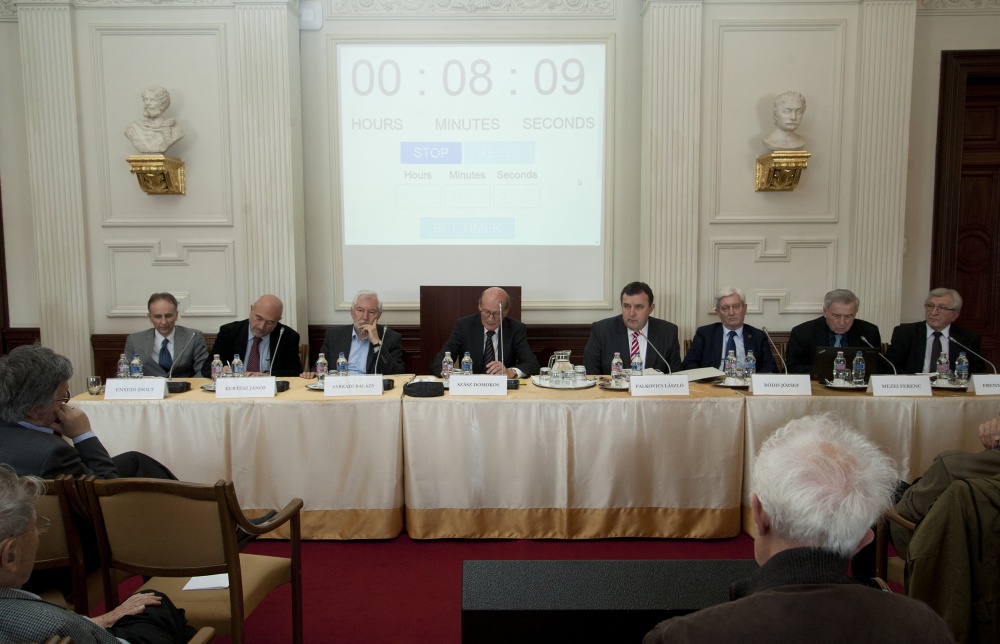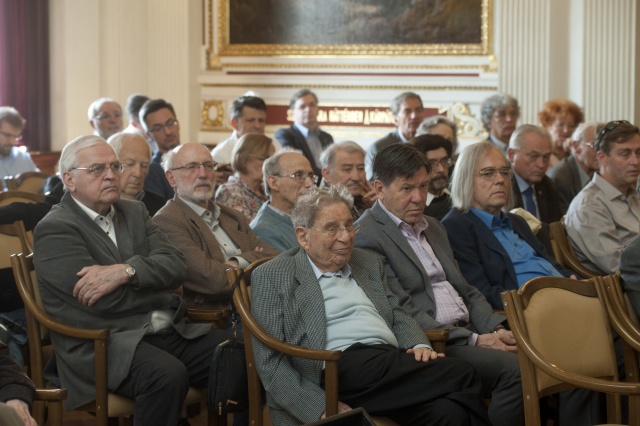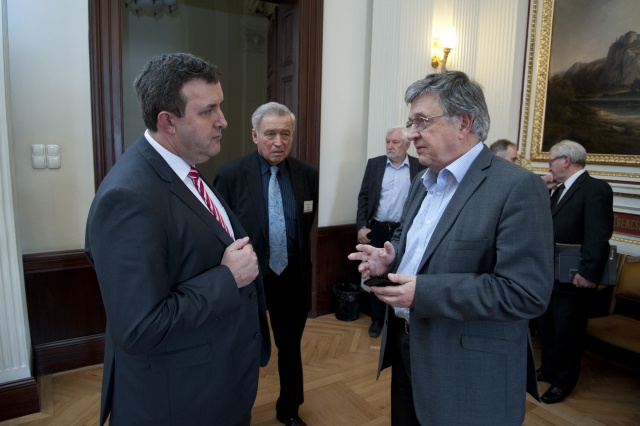Lex CEU – negotiation attempt at the Academy’s headquarters
Shortly after the CEU case came to light, the President of the Academy, László Lovász, offered to help mediate between the two parties, namely the Hungarian government and the Central European University (CEU) in Budapest. Since then, the General Assembly of the Academy has passed a resolution supporting the uninterrupted work of the CEU and backing the President’s plan to mediate between the two sides as well. On 11 May 2017, President László Lovász met the participants of a round table discussion in the main building of the Academy, together with almost a hundred scientists and some invited journalists.
12 May, 2017
At the meeting, Pro-Rector Zsolt Enyedi represented the Central European University, while the Minister of State for Education, László Palkovics, appeared on behalf of the Ministry of Human Capacities. Further participants included József Bódis, President of the Hungarian Rectors’ Conference (HRC); László Frenyó, Dean of McDaniel College Budapest; Professor János Kertész, CEU; Professor Ferenc Mezei, European Spallation Source (ESS); and Professor Balázs Sarkadi, Institute of Enzymology, MTA Research Centre for Natural Sciences. Moderating the discussion was recently retired Vice President of the Academy, Domokos Szász.
 Participants of the round table discussion (from left to right): Zsolt Enyedi, János Kertész, Balázs Sarkadi, Domokos Szász (moderator), László Palkovics, József Bódis, Ferenc Mezei and László Frenyó Source: mta.hu/Tamás Szigeti
Participants of the round table discussion (from left to right): Zsolt Enyedi, János Kertész, Balázs Sarkadi, Domokos Szász (moderator), László Palkovics, József Bódis, Ferenc Mezei and László Frenyó Source: mta.hu/Tamás Szigeti In the allotted time László Palkovics and Zsolt Enyedi basically presented their previously advocated views therefore, no significant progress was witnessed.
László Palkovics argued that the amendment of the Education Bill is not tailored to a certain university, nor does it curtail the freedom of education. Rather, it aims at providing equal conditions for all higher education institutions and ensuring a high quality of education. According to Mr. Palkovics there are no unassailable obstacles for the CEU that would prevent them from further operation in Budapest.
In contrast, Zsolt Enyedi considers the present amendment of the Education Bill unprecedented in Europe and in his view the amendment is politically motivated and tailored against the CEU. He criticised the very short deadlines set out by the act, which the CEU cannot possibly meet. Furthermore, he also protested due to the fact that there had been no direct discussion between the Hungarian government and the CEU leadership, neither during the preparation of the amendment nor since its passing.
 Source: mta.hu/Tamás Szigeti
Source: mta.hu/Tamás Szigeti Ferenc Mezei highlighted the importance of ensuring equal opportunities for Hungarian universities, which should include the right to issue non-domestic degrees. He proposed that the CEU could serve as a model for other Hungarian universities in this respect.
Balázs Sarkadi elaborated on the background of the resolution passed by the 188th General Assembly. He also claimed that the amendment of the Education Bill “almost equals martial jurisdiction”.
László Frenyó argued that the Lex CEU (especially the part of it stating that a valid contract between the United States and Hungary is required for the functioning of a university) is also a threat to McDaniel College. He claimed, however, that the 2008 international contract between the United States and Hungary could meet the requirements of the amendment, which could also solve the problem of the CEU.
József Bódis declared that there might be a consensus in saying that the “CEU case” had a very negative impact on Hungarian higher education and its international reputation. He listed four fundamental questions: (i) Is it a good thing that the CEU was founded 25 years ago? (ii) Has the CEU provided value in the past 25 years? (iii) Do we want the CEU to work uninterrupted here in the future? (iv) Do we want all higher education institutions to respect the current laws and regulations? His answer to all four questions was “Yes”. Now the most crucial task is to find a solution that would eliminate “the CEU case,” according to Bódis.
János Kertész expressed his criticism concerning the suggestive nature of the amendment and the accelerated procedure for passing the act. He regarded it fundamental to follow the most important rules of conflict management in the debate. He suggested putting past grievances aside and stressed the importance of mediation. And the president of the Academy is now further supported in this latter task through the decree issued by the General Assembly.
 László Palkovics (left) and László Lovász before the round table discussion Source: mta.hu/Tamás Szigeti
László Palkovics (left) and László Lovász before the round table discussion Source: mta.hu/Tamás Szigeti In his concluding remarks László Lovász warned that there is no use talking about the “competitive edge” of Hungarian universities, as real competition takes place on international grounds, and it is a well-known fact that an outstanding institution can help others. He mentioned the cooperation between the Cognitive Science Department of the CEU and KOKI (MTA Institute of Experimental Medicine) as a good example. The President of the Academy found it crucial that other Hungarian universities should be able to accept a high number of visiting professors, researchers and students from abroad, in a similar manner to the CEU. Besides raising funds, the modification of laws concerning the administrative background of this process is also necessary, which the MTA is also initiating.
Following the discussion, President László Lovász told mta.hu that in line with preliminary expectations, no breakthrough had been reached at this first meeting. This is not surprising, as only an elaborate discussion of legal and organisational details by experts could provide a solution to this problem. If the participants of the round table discussion were able to get closer to starting negotiations of this kind, the arrangement of this meeting was worthwhile.



